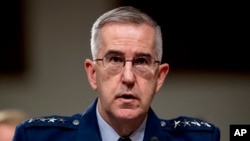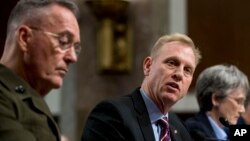The general in charge of the U.S. military's space assets told a skeptical Congress on Thursday that creation of a Space Force was inevitable.
"So, we're going to have a Space Force someday," U.S. Air Force Gen. John Hyten, commander of U.S. Strategic Command, told members of the Senate Armed Services Committee. "I think what the committee has to decide is when."
Hyten said the Pentagon has a history of creating a military service to deal with "every physical domain we have, when it becomes contested."
Others' progress
"Our competitive advantage in space has eroded," said Marine Gen. Joseph Dunford, chairman of the Joint Chiefs of Staff, explaining that China and Russia have built capabilities to counter the U.S. in space to include "jamming, cyber operations, directed energy weapons, on-orbit capabilities and ground-based anti-satellite missiles."
Hyten and Dunford urged Congress to "get ahead of the problem" of space defense, rather than waiting and responding to a catastrophe.
If approved, the Space Force would be the sixth military service branch and the first created since 1947.
The administration's Space Force proposal faced bipartisan skepticism during the hearing.
Sen. Angus King, an independent from Maine, said he was "genuinely undecided" on whether to approve a Space Force, in part because he said the status quo on space defense was working well.
"I don't think it's broken. ... You're doing a good job. Why are we going to 'fix' it?" King asked Pentagon officials.
Sen. Jack Reed, a Democrat from Rhode Island, acknowledged that "the threat is real" in space, but said it was "risky" to allow the Pentagon to create another bureaucracy "without more robust budget details."
Sen. Joni Ernst, an Iowa Republican, said she needed "some convincing that there is a necessity for a sixth branch" of the military.
Higher priority
Hyten, who is the top-ranking commander for space defense as commander of U.S. Strategic Command, bluntly told committee members that space defense would never be his top priority, since he also oversees the U.S. nuclear weapons arsenal.
He said commanders of the new U.S. Space Command would be able to solely focus on space defense, while the top general of the proposed U.S. Space Force would be able to solely focus on building new space assets and developing space war fighters.
Acting Secretary of Defense Pat Shanahan said the new organization within the Pentagon would allow the military to "consolidate and concentrate" on space defense, "instead of coordinating across more than 10 organizations."
"The next major conflict may be won or lost in space," Shanahan said. "Approached correctly, this is an opportunity for generational improvement."





